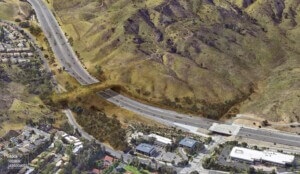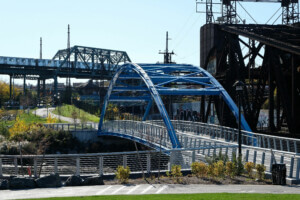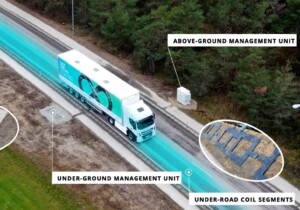The Biden Administration’s colossal $1.2 trillion bipartisan infrastructure bill was passed by the United States Senate yesterday afternoon in a final vote of 69-30 after months of heated debate, tense negotiations, (increasingly rare) instances of across-the-aisle unanimity, and no shortage of infuriating conservations about what exactly “infrastructure” is. Nineteen Republicans bucked former President Trump, including Senate Minority Leader Mitch McConnell, to vote in favor of its passage despite being subject to threats and name-calling from the ex-president.
Although the passage of the sweeping, 2,000-page-plus bill marks a resounding win for President Joe Biden and senators from both parties, it isn’t too early to retire those Trump-era Infrastructure Week jokes quite yet: The bill—formally known as the Infrastructure Investment and Jobs Act—now must return to the House of Representatives for a final vote, which will not happen until later this month when representatives return from an abbreviated recess. Even then, it faces an uncertain future and a potentially drawn-out path to becoming law as House Speaker Nancy Pelosi will not bring the bill to vote until the Senate also passes a sprawling, Democratic-only $3.5 trillion reconciliation bill that includes funding for top-of-list progressive priorities like combatting climate change, Medicare expansion, universal preschool, and more. Only when—and presumably if—it is passed by the House, the blockbuster bill will then land on Biden’s desk to be signed.
Among other things, the package, which was first unveiled in March with a $2 trillion price tag, calls for: $550 billion in new federal spending over the next five years including $110 billion in repairing and replacing the country’s crumbling roads and bridges, $66 billion dedicated to bolstering freight and passenger rail networks, $65 billion to shore up the increasingly vulnerable electric grid, $65 billion to improve broadband internet access, $55 billion for improving aging water infrastructure including the replacement of lead pipes, $39 billion to expand and enhance public transit systems, $25 billion for airports, and $7.5 billion to establish a national network for electric vehicle charging infrastructure.
One notable initiative included in the spending package to receive funding, albeit funding that was dramatically reduced by 95 percent from a proposed $20 billion to $1 billion, is the Reconnecting Communities Initiative. Touted by both Biden and Transportation Secretary Pete Buttigieg, the plan commits to investing in and, when possible, fusing back together historically Black neighborhoods in cities like New Orleans and Rochester, New York, that were fractured by mid-20th-century interstate highway construction projects. As Buttigieg said in April: “There is racism physically built into some of our highways.”
In addition to reconnecting communities, the plan vows to “increase opportunity, advance racial equity and environmental justice, and promote affordable access” in future infrastructural projects. However, the sharply reduced allocation to kickstarting the racist road-dismantling plan has prompted dismay and disappointment from activists who believe that $1 billion simply isn’t enough to be spread around effectively and impart real change in the communities that need it the most.
“It felt like they were listening to us, to the communities, banging on the table and saying these changes were going to happen,” Shawn Dunwoody, an artist, activist, and cofounder of Rochester’s Hinge Neighbors group, told NBC News earlier this month. “But now it’s like, ‘Is there any hope or gain in government?’“
Noting that the Senate bill takes a “first step in recognizing buildings as infrastructure,“ the American Institute of Architects (AIA) cautiously welcomed its passage while also urging lawmakers to consider further investments in the built environment, particularly with regards to sustainability and resiliency, as part of the second infrastructure bill that will move through the Budget Reconciliation process this fall.
“To meet the challenges of the 21st century, our nation’s infrastructure funding needs to move beyond roads and bridges to include schools, hospitals, homes and more, especially as buildings contribute nearly 40 percent of worldwide carbon emissions,” said AIA 2021 President Peter Exley, FAIA, in a statement. “This bipartisan legislation represents an important step toward improving our nation’s buildings. However, we urge lawmakers to ensure greater funding for building improvements is included in the Budget Reconciliation package. By doing so, we can make meaningful progress on reducing the built environment’s impact on climate change.”
As detailed by the AIA in a press release, these key provisions include:
- “Providing $3.5 billion in funding for the Department of Energy’s (DOE) Weatherization Assistance Program, which increases energy efficiency and reduces costs for low-income households.
- Authorizing $500 million in competitive grants to support energy efficiency and renewable energy in schools.
- Allocating $1 billion for the Federal Emergency Management Agency’s (FEMA) Building Resilient Infrastructure and Communities (BRIC)
- Allocating $500 million for grants established from the Safeguarding Tomorrow through Ongoing Risk Mitigation Act(STORM Act), which mitigates hazards to reduce risks from disasters.
- Providing $250 million in funding to establish the Energy Efficiency Revolving Loan Fund Capitalization Grant Program, which states could use to improve the energy efficiency of residential and commercial buildings.
- Establishing a $225 million competitive grant program within the DOE’s Building Technologies Office to support cost-effective building code implementation.
- Establishing a $40 million grant program to train individuals to conduct energy audits and surveys of commercial and residential buildings.
- Developing building, training, and assessment centers through institutions of higher education and Tribal colleges to train architects, engineers, and other professionals about energy-efficient design and technologies, along with fostering additional research.
- Allowing the Metropolitan Transportation Planning authorities to use federal funding to promote more walkable and multi-modal communities.”
“The infrastructure bill we passed will deliver the most robust injection of funds into America’s infrastructure in decades, said Senate Majority Leader Chuck Schumer of New York in a tweeted statement. “But our work isn’t done. We’ll soon vote on a budget resolution to make historic investments in American jobs, families, & the fight against climate change.”











